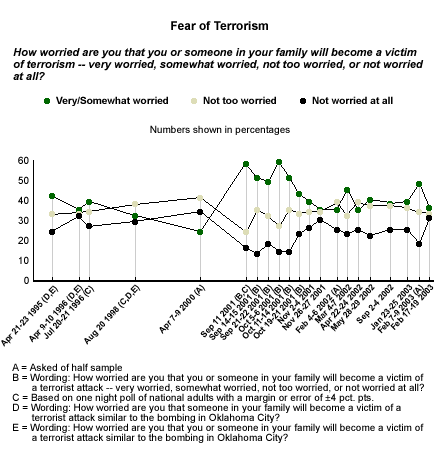Long before that fateful September day when suicide bombers destroyed the World Trade Center, Americans worried about global dangers. The United States ushered in the age of nuclear weapons with the dropping of an atomic bomb on Hiroshima, Japan, on Aug. 6, 1945, and on Nagasaki three days later. Two months after World War II ended, Gallup asked Americans, "Do you think we can develop a way to protect ourselves from atomic bombs in case other countries tried to use them against us?" A slim majority (53%) said "yes," 22% said "no," and 25% had no opinion.
The Cold War
After World War II, Russia and the United States began an arms race to develop more powerful, longer-range nuclear weapons. The Cold War, described in 1948 by various Gallup respondents as a "war of nerves," of "words," of "ideas," "bluffing," "wrangling," "bickering," and "diplomatic maneuvering," unsettled everyone. In the 1950s, "fallout shelters" began sprouting up in towns, cities, and even neighbors' backyards.
When asked in 1960 if they "would favor or oppose a law which would require every community to build public bomb shelters," 72% of Americans said they would favor such a law. A little over a year later, Gallup asked the following open-ended question, "Have your fears about nuclear war or [nuclear] fallout had any effect on your outlook on life or your plans for the future?" About a third of Americans (30%) said they felt a general dread or fear, 17% mentioned something about fallout shelters, 11% said that it was hard for them to make plans for the future, and 10% said they had a pessimistic outlook and weren't sure whether or not they would wake up alive each day.
On Oct. 15, 1962, President John F. Kennedy addressed the nation and told Americans that Cuba, just 90 miles from the Florida coast, had medium- and intermediate-range ballistic missiles aimed at the United States. Two tense weeks followed, during which time the United States drew closer to nuclear war than at any other time in history. Several months after the crisis abated, Gallup asked, "If we should happen to get into an all-out nuclear war, what do you think your own chances would be of living through it?" Just 5% of the population thought their chances of surviving were "very good." Fifty-two percent said their chances were "poor," and another 37% thought their chances were " just 50-50."
Recent Threats
On Feb. 26, 1993, an Islamic extremist group bombed the World Trade Center, killing six people and injuring more than 1,000. On April 19, 1995, Timothy McVeigh bombed the Murrah Federal Building in Oklahoma City, killing 168 people. Two days later, Gallup asked, "How worried are you that you or someone in your family will become a victim of a terrorist attack similar to the bombing in Oklahoma City?" Forty-two percent said they were "very" or "somewhat" worried.

Millennium Madness
In 1999, Americans were counseled to stockpile water, money, food, and medicine in anticipation of the dawn of the year 2000, when they were warned that computers may not recognize "00" as a year and launch an all-out rebellion against us. Although 42% of Americans said they had or intended to obtain stockpiles (according to a Dec. 16-19, 1999 poll), just 22% of Americans told Gallup that they would likely feel "apprehensive or fearful" on New Year's Eve.
Bottom Line
In his first inaugural address on March 4, 1933, President Franklin Delano Roosevelt spoke to the fears of Americans who were then in the depths of economic disaster. He said, "The only thing we have to fear is fear itself." Roosevelt went on to say that "[the difficulties] concern, thank God, only material things." After Sept. 11, 2001, Americans know only too well what to fear -- and it is far more deadly than the material things Roosevelt had in mind.
Responses to the question regarding concern about terrorism now seesaw up and down according to the color-coded threat level (see Related Items). Hopefully, Americans will learn to take comfort in Ready.gov, much the same way their parents and grandparents relied on fallout shelters, to provide a sense of security in times of fear.
